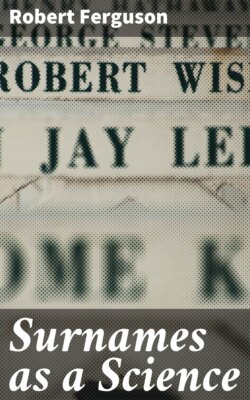Читать книгу Surnames as a Science - Robert Ferguson - Страница 7
На сайте Литреса книга снята с продажи.
FOOTNOTES:
ОглавлениеTable of Contents
[1] From the old Saxon fragment called the "Traveller's Song." Hnaf is no doubt from the Ang.-Sax. cnafa, cnapa, son, boy, the Anglo-Saxons often representing c by a (no doubt aspirated) h.
[2] Stark also adduces an instance in the eleventh century of Buggo as a contraction of Burchard.
[3] So at least Foerstemann seems to think, observing that we can scarcely derive it from Maur, Æthiops, English "Moor." Nevertheless, seeing the long struggle between the Teutons and the Moors in Spain, it seems to me that such a derivation would be quite in accordance with Teutonic practice. See some remarks on the general subject at the end of Chapter IV.
[4] So that we may take it that Virgilius, as the name of a Scot who became bishop of Salzburg in the time of Boniface, was his own genuine Celtic name, and not derived from that of the Roman poet.
[5] This name, that of a prince of the Batavi, is considered by the Germans to be properly Hariovalda, from har, army, and hence is another instance of an initial h being represented among the Romans by a c. The name is the same as the Anglo-Saxon Harald, and as our present name Harold.
[6] For this explanation of vertragus I am indebted to Gluck.
[7] There was an English admiral of this name, though I do not know of it at present.
